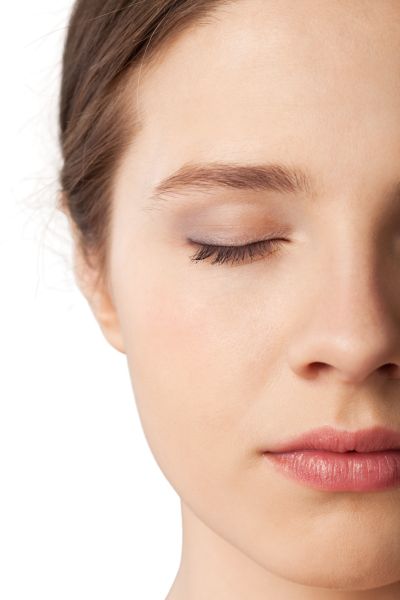What to Expect During Rhinoplasty Revision Recovery
Written by Dr. Smita Ramanadham. Posted in Blog.

Preparing for rhinoplasty revision recovery?
Let’s take a look at what you can expect in terms of discomfort, physical symptoms, and average length of recovery time. Next, we’ll offer up our favorite tips for easing this healing experience and ensuring an excellent outcome for your rhinoplasty revision.
Revision Rhinoplasty Recovery
When it comes to the rhinoplasty healing process, your revision surgery recovery will be much like the recovery of your previous surgery. Of course, symptoms will inevitably vary from patient to patient and procedure to procedure. For most patients’ revision rhinoplasty recovery timeline, the initial healing period lasts for around two weeks.
You may have a splint on your nose during this time. This will need to stay on for around a week. Most patients want to take off at least this much time from work as well.
Over the first week, you will experience symptoms of bruising, soreness, and swelling. This will be worst over the first few days of your recovery. You can be prescribed pain medications to help with discomfort. Ice packs may help as well, but be sure to follow your surgeon’s specific ice pack application directions.
Light walking after your surgery is encouraged. Just wait a few days to do so. It’s important to keep your physical activities very light for the first few weeks as you do not want to do anything that my promote bleeding around your treatment area.
You should also avoid blowing your nose, lifting anything heavy, and bending over as this may exacerbate bleeding or the formation of more scar tissue. After several weeks of recovery, your surgeon will allow you to start reintegrating other physical activities into your daily routine.
Planning Tips for Your Revision Rhinoplasty Recovery Time
 It’s good for revision rhinoplasty patients to plan ahead as they approach their rhinoplasty surgery. Any type of facial plastic surgery can leave you down for the count for at least a few days, so doing the prep work up front can go a long way. Here are some tips we recommend.
It’s good for revision rhinoplasty patients to plan ahead as they approach their rhinoplasty surgery. Any type of facial plastic surgery can leave you down for the count for at least a few days, so doing the prep work up front can go a long way. Here are some tips we recommend.
Figure out how you want to plan meals.
Eating is one thing you can’t avoid during your recovery process, so planning ahead here can go a long way. We recommend creating some easy freezer meals, signing up for a meal service, asking friends or family for help in the kitchen, and/or setting up grocery delivery.
Create the proper sleep environment.
You’ll likely need to sleep with your head elevated for the initial recovery period, but as always, be sure to follow your unique post operative instructions. If you do need to sleep with your head elevated, it might be wise to invest in a wedge pillow or a bed that can be lifted at the head.
Some patients opt to sleep in an easy chair for the first few nights. Whatever you do, just be sure that you set up your sleeping area ahead of time so that you don’t have to worry about it when you are in a delicate state upon returning home from surgery.
Plan to use ice packs and pain medications to ease discomfort.
As you know from your previous surgery, rhinoplasty can certainly cause discomfort during the recovery period. This is what the pain medication that you will be prescribed is for, so be sure to use it as directed. Some patients opt to pick their medications up before surgery so that they have them ready when they return home.
Your plastic surgeon may also recommend using ice packs to both ease discomfort and reduce swelling. Just be sure to use the proper ice packs and follow your surgeon’s directions closely because improper ice pack use may cause more harm than good.
Don’t be afraid to ask for help.
This goes both for requesting help from friends and family members and asking for help from your plastic surgeon. You should never be worried about “bothering” your plastic surgeon or their staff with questions or concerns you may have. Be sure to keep an open communication line with your surgeon, and attend all follow-up appointments.
Likewise, seek help from friends and family when possible. Most loved ones will be happy to assist with running errands, performing child care, helping out around the house, or just keeping you company.
FAQ: Revision Rhinoplasty Surgery
How is a revision rhinoplasty different from initial rhinoplasty?
Initial rhinoplasty, also called primary rhinoplasty, is typically meant to correct cosmetic issues of the nose or breathing difficulties. The same goes for revision rhinoplasty, but the need for revision rhinoplasty surgery typically indicates that there were issues with the first rhinoplasty procedure (sometimes called a “nose job”).
Sometimes, the problem with the initial surgery is related to visual changes, but issues may be breathing related as well. Rhinoplasty in any form is a complex surgery, and sometimes, even an expert facial plastic surgeon can’t control a certain way that the nose and nasal tissues heal. Revision nose surgery, in this way, is not actually uncommon.
To learn more about this topic, we invite you to check out our other revision rhinoplasty recovery blog posts.
What’s the cost of revision rhinoplasty?
A revision procedure for rhinoplasty is often more expensive than the initial surgery. In fact, revision rhinoplasty cost may be more expensive by even several thousand dollars.
Naturally, any additional procedures such as chin liposuction that are performed at the same time as your revision rhinoplasty procedure will increase the cost as well. For an accurate quote, book a consultation with the plastic surgeon you are considering.
Request Your Consultation With Dr. Smita
 Are you looking for the best revision rhinoplasty surgeon in the New Jersey area?
Are you looking for the best revision rhinoplasty surgeon in the New Jersey area?
Female board certified plastic surgeon Dr. Smita Ramanadham performs primary and revision rhinoplasty at her New Jersey practice. Dr. Smita has many years of experience and is known for her extensive skill, attention to detail, and closeness with patients.
To book a consultation appointment with Dr. Smita, please call our office today.
References
https://www.plasticsurgery.org/news/blog/what-to-expect-during-your-rhinoplasty-recovery